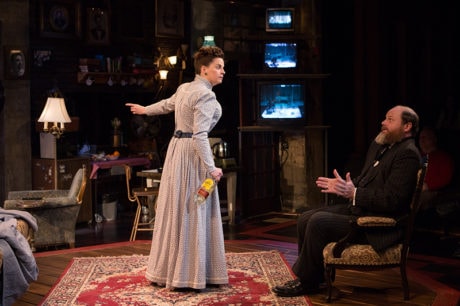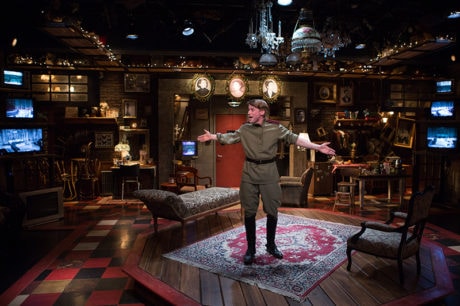A shout-out to Studio Theatre co-founder Russell Metheny, who designed the complex on 14th Street, for installing a backstage stairway connecting the dressing rooms of the second-floor Milton and the ground-floor Mead. Were it not for that architectural passageway, there could be no No Sisters, and DC would be deprived of Writer-Director Aaron Posner’s latest transfiguration of Chekhov—a play that bounces off Three Sisters with such spunk and sensibility it seems the reason the Russian one was written.
Following on Stupid Fucking Bird (Posner’s hilarious rejuvenation of The Seagull) and Life Sucks (his delightful ditto of Uncle Vanya), No Sisters again out-Chekhovs Chekhov. It is a genius comedy of the soul that lets loose what Chekhov kept a lid on.

While downstairs in the Mead a cast of fifteen perform Three Sisters on a sparse birch-studded set, upstairs in the Milton eight of them perform No Sisters in what the program calls “a weird-ass existential Chekhovian green room.” As wittily designed by Daniel Conway, the place is packed full of properties storage, mismatched furnishings, costume racks, clustered chandeliers, tables for makeup and snack breaks… Upstage by the door to downstairs is a dart board, with which actors pass the time before showtime.
Both plays clock in at the same running time, with the same elapsed times between their four acts and their intermissions syncing. The actors in No Sisters wear the same costumes designed by Jessica Ford that they wear in their roles downstairs. (The rest of the excellent design team is shared as well: Lighting Designer Jesse Belsky, Sound Designer Christopher Baine, Composer James Barry. Tech week must have been unusually aerobic.) Seven television monitors in the No Sisters set keep watch on what’s happening on the stage below.
We are aware all the time there this other play going on, in a parallel world, in some amazing simultaneity. And that is so cool. The actors in No Sisters all play supporting roles in Three Sisters. (The actors playing the three sisters themselves, Ólga, Másha, and Irína, presumably have a green room elsewhere). The actors in No Sisters also go in and out of their Three Sisters characters, which becomes astonishingly dramatic.
Typically the actors address the audience directly, in riffs both fun and clever, especially at the beginning as we are introduced to them one by one. Quickly, though, we catch on to Posner’s inspired conceit: These actors come to this green room to vent on behalf of their characters’ inner lives, to say what Chekhov left unspoken, to deliciously chew scenery instead of making do with meaningful looks and pauses. As clouds gather over these characters and their story lines darken, this becomes incrementally a deeply moving tragicomedy. Like standup meets primal scream therapy.
What Posner has done in No Sisters is to script for each actor no-holds-barred monologues. These speeches, as played by the No Sisters cast with pull-out-all-the stops emotion, make for a piling on of peak theatrical experiences.
Biko Eisen-Martin plays the brooding, volatile soldier Solyóny with powerful range and rage. Ro Boddie plays his amiable battle buddy Túzenbach with equal passion and presence. The idealistic Fedótik, youngest of the three soldiers, is played by William Vaughn with a heaping of hope that lifts the spirit of the whole play.

True to Chekhov, Posner’s characters fall on a subtly calibrated continuum from happiness to despair, from contentment to yearning, from elation to boredom. What makes this human comedy so funny and touching is the crystalline compassion in Posner’s writing and its honest observations about life.
As the three sisters’ pathetic older brother Andréy, unhappy with his own inadequacy, Ryan Rilette gives a performance that is wonderfully measured: it stops short of maudlin, it only makes us warm to him. As Kulygin, Másha’s upstanding but clueless husband, Todd Scoffield gives a performance that is equally well balanced: it stops short of smarmy, it makes us ache for him when he is betrayed.
Standing out from these five amazing performances by men are two women who stop the show.
In Three Sisters, Natásha, Andréy’s wife, is an imperious shrew, liked by no one except possibly her husband’s boss with whom she has an affair. Posner, though, has given Natásha virtual arias about what she’s feeling—not just her peevish temper but her hurt and longing—and Kimberly Gilbert belts them with so much heart the house can hardly hold them.
In Three Sisters, Anfisa is an octogenarian serving woman who cared for the four siblings from their birth and whom Natásha wants to fire. It’s a small but touching part. Her role in Posner’s play, however, is huge, and Nancy Robinette’s performance in it is monumental. Anfisa has a speech about “what love is” that Robinette delivers with such wrenching lyricism it can send tremors to one’s core.
“Listen to me now. Listen,” Anisa tells the naive Fedótik, who is smitten with Irína:
Love is… acceptance. Shocking, transformative, radical acceptance. It is Your Everything, in intimate and immediate relation, to Her Everything.
Love is a force, a fever, an eternal, unassuageable longing.
Love is Impossible: Impossible to have, impossible to hold, impossible to lose, impossible to know, impossible to live with, impossible to live without.
Daven Ralston (who plays a mean violin in Three Sisters) appears in a sweetly stunning turn as Young Woman, a specter character invented by Posner. She shows up in the imagination of Anfisa as Anfisa’s younger self. Their short scene together is so lovely and so beautifully performed it could be a playlet unto itself.
Does one need to have seen Three Sisters in the Mead before seeing No Sisters in the Milton? That’s what I did, and I can report it helps give thematic context and character familiarity to No Sisters. But No Sisters can also stand on its own as engaging entertainment and tour de force acting. With or without Chekhov’s Three Sisters (but ever indebted to it), Aaron Posner’s No Sisters gives audiences three of the most insightful and satisfying hours in locally grown and nourished theater.
There’s a point in the play when Kulygin gives a speech that mentions the importance to civilization of funding for the arts:
We want to survive and the thing about Civilization is… it helps. It just… you know… helps. It makes things better. For more people. More of the time… Rules. Laws. Sewage Systems. Fire Codes. Patents. Public Education. Meals on Wheels. Funding for scientific research. Funding for the arts. Civilization makes things better for more of the people more of the time.
And that is why there is always Hope.
On opening night, the audience broke out in applause. Perhaps somewhere Chekhov cheered too.
Running Time: Approximately three hours, including one 15-minute intermission.
No Sisters plays through April 23, 2017, at The Studio Theatre – 1501 14th Street, NW, in Washington, DC. For tickets call the box office at (202) 332-3300, or purchase them online.
LINKS:
Review: No Sisters at The Studio Theatre by John Stoltenberg.
Review: Three Sisters at The StudIo Theatre by Andrew Walker White.
Note: Free vodka shots are offered upstairs at intermission of No Sisters and downstairs in the lobby after both shows end.





